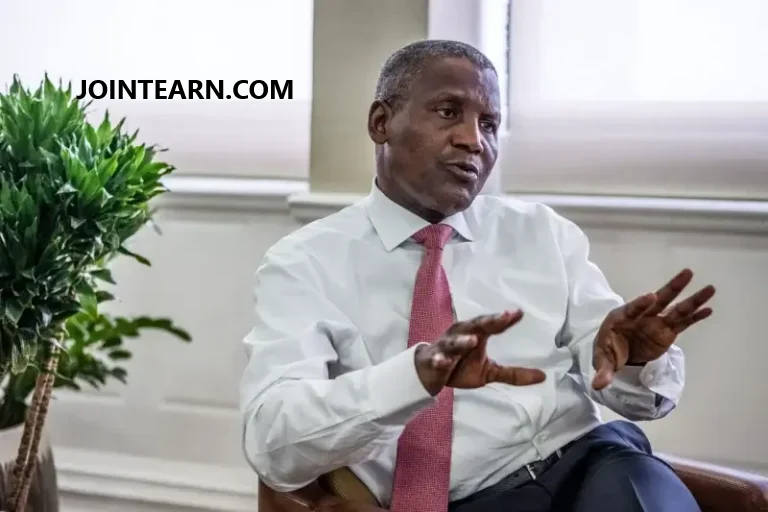Africa’s richest man and business mogul, Aliko Dangote, has raised concerns over the Nigerian government’s contribution to the country’s Gross Domestic Product (GDP), stating that it accounts for only 15%. The billionaire industrialist made this revelation while speaking at an economic summit, where he emphasized the need for the government to play a more significant role in fostering economic growth and development.
Dangote’s Economic Insight
During his address, Dangote expressed disappointment in the low percentage of GDP that the government contributes, arguing that stronger public sector involvement is necessary to drive sustainable economic progress. He stated, “For a country with enormous resources and a large population like Nigeria, the government’s contribution to GDP should be much higher. The private sector is doing its best, but the government must step up.”
He further noted that in developed economies, the government plays a crucial role in infrastructure development, policy reforms, and business incentives, which contribute significantly to GDP. However, in Nigeria, bureaucratic inefficiencies and policy inconsistencies have hindered the government’s ability to make a meaningful impact on the economy.
The Role of the Private Sector
Dangote acknowledged the resilience of Nigeria’s private sector, which he described as the primary driver of economic activities. He pointed out that industries such as manufacturing, telecommunications, banking, and agriculture have continued to thrive despite challenges such as inadequate infrastructure, erratic power supply, and inconsistent government policies.
According to him, “The private sector has been the backbone of Nigeria’s economy. If not for the efforts of private businesses, the country’s economic situation would be worse.” He added that companies like Dangote Group have invested billions in various sectors, including cement, agriculture, oil refining, and petrochemicals, to boost production capacity and create jobs.
Challenges Facing Nigeria’s Economic Growth
Despite the efforts of the private sector, Dangote highlighted some of the critical issues affecting Nigeria’s economic growth. These include:
- Poor Infrastructure – He emphasized the need for massive investment in roads, ports, railways, and electricity to improve business operations.
- Unstable Policies – Frequent changes in government policies have discouraged both local and foreign investors.
- Foreign Exchange Crisis – The volatility of the Nigerian currency and inconsistent forex policies have impacted business operations.
- Insecurity – Persistent security challenges, such as banditry and insurgency, have affected agricultural production and investment in key sectors.
He urged the government to address these issues promptly, as failure to do so would continue to hinder economic progress.
Call for Government Reforms
Dangote stressed the importance of reforms that would allow the government to contribute more effectively to the economy. He recommended the following measures:
- Public-Private Partnerships (PPPs): Encouraging collaborations between the government and private sector to fund and develop infrastructure projects.
- Policy Stability: Creating and maintaining consistent policies that will attract long-term investors.
- Diversification: Reducing Nigeria’s over-reliance on oil by supporting agriculture, manufacturing, and technology sectors.
- Ease of Doing Business: Implementing policies that reduce red tape and bureaucratic bottlenecks for businesses.
He also called for a transparent and efficient government system that prioritizes economic development over political interests. According to him, “We need a government that works hand-in-hand with the private sector, not one that competes or creates unnecessary obstacles.”
Economic Experts React
Following Dangote’s remarks, several economic analysts have weighed in on the discussion. Some experts agree with him, stating that Nigeria’s economic growth has been largely driven by the private sector, while the government has struggled with inefficiencies and corruption.
An economist, Dr. Kemi Adebayo, commented, “Nigeria’s economic future depends on serious reforms. The government must recognize that without deliberate action, the private sector cannot carry the entire weight of the economy.”
Another analyst, Dr. Mike Nwosu, argued that the government needs to increase its budget for infrastructure and social services, ensuring that its spending directly impacts GDP growth.
Conclusion
Aliko Dangote’s comments have once again ignited discussions about the role of the Nigerian government in economic development. While the private sector continues to drive major industries, the government’s low contribution to GDP remains a pressing concern. As Nigeria faces economic challenges, experts believe that enacting the right reforms could boost the government’s role in national development and create a more robust economy for all.












